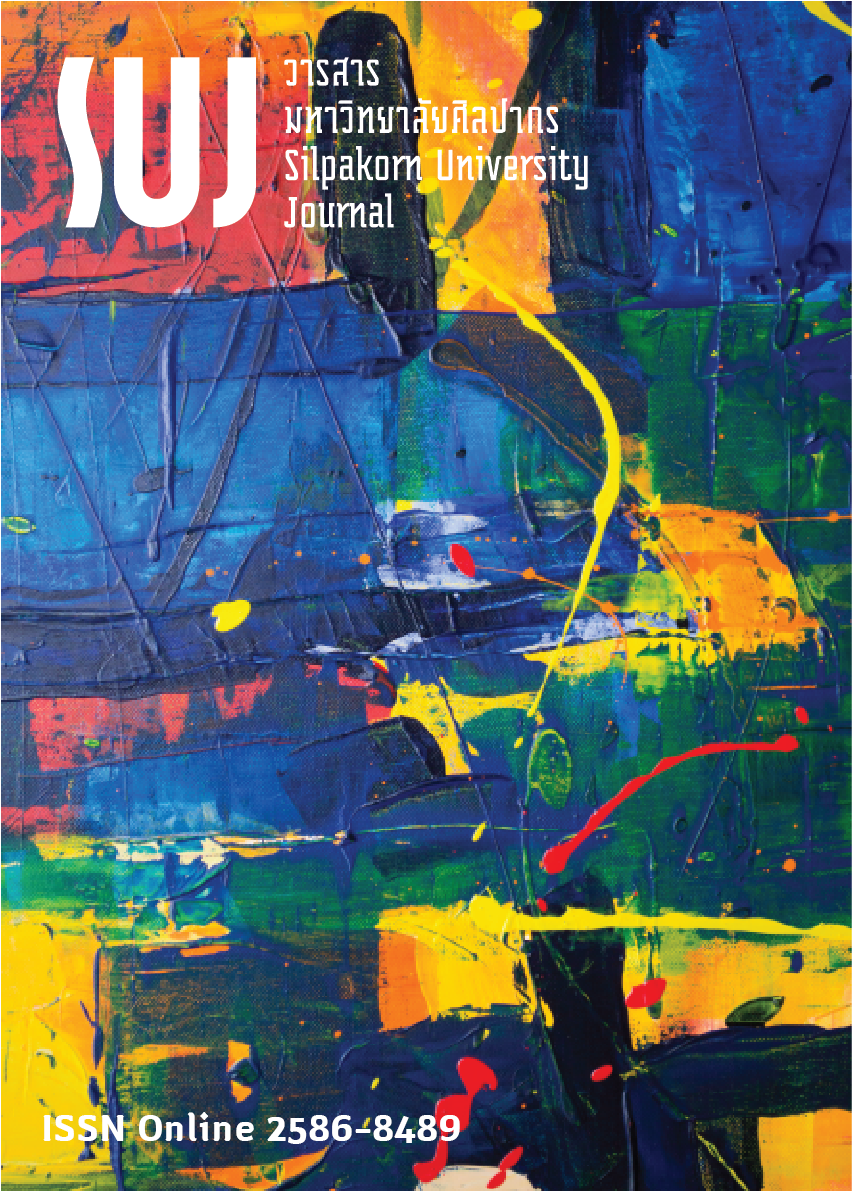วิธีคิดในการแสวงหาพยานหลักฐานทางนิติวิทยาศาสตร์คดีจราจร (The Way of Thinking : Forensic Evidence in Road Crash Investigation)
Main Article Content
Abstract
คนไทยตายจากอุบัติเหตุทางถนนสูงติดอันดับโลก คือ สถานการณ์ที่สะท้อนให้เห็นถึงความจำเป็นในการค้นหาองค์ความรู้ใหม่ในการแก้ไขและป้องกันปัญหาอุบัติเหตุทางถนน (อบถ.) ที่เกิดขึ้น เพราะนอกเหนือจากการทำให้เกิดความสูญเสียต่อชีวิตและทรัพย์สินของคนไทยจำนวนมากแล้วนั้น ยังทำให้ภาพลักษณ์ของประเทศไทยที่มีต่อประชาคมโลกไม่ดีอีกด้วย
ผู้วิจัยตั้งคำถามการวิจัยว่า ทำไมการสอบสวนคดีจราจรของตำรวจจึงไม่เป็นที่น่าเชื่อถือในสังคมไทย ? ทำไมสถิติคนตายจากอบถ. ในประเทศไทยจึงติดอันดับโลก ? จากคำถามทั้ง 2 ข้อดังกล่าวนำไปสู่การ ตั้งคำถามรองและวัตถุประสงค์ ในการวิจัยที่สำคัญคือวิธีคิดและวิธีการในการแสวงหาพยานหลักฐานทางนิติวิทยาศาสตร์ของพนักงานสอบสวนในคดีจราจร เป็นอย่างไร ?
ผู้วิจัยใช้ระเบียบวิธีวิจัยเชิงคุณภาพเป็นวิธีการหลักในการตอบคำถามวิจัยนี้ โดยการรวบรวมความรู้จากพื้นที่วิจัย ในเขตรับผิดชอบของตำรวจภูธรภาค 1 ผู้ให้ข้อมูลหลักคือพนักงานสอบสวนที่มีประสบการณ์ในการทำคดีจราจรที่มีคนตาย จำนวน 60 คน และเจ้าหน้าที่นักวิทยาศาสตร์พิสูจน์หลักฐานจำนวน 7 คน ใช้เทคนิคการเก็บข้อมูลด้วยวิธีการสนทนากลุ่ม การสัมภาษณ์เชิงลึก และการศึกษาค้นคว้าเอกสารสำนวนคดีจราจรจำนวน 262 สำนวน ใช้วิธีการวิเคราะห์ข้อมูลเชิงเนื้อหา
ผลการวิจัยพบวิธีคิดสำคัญ 3 ประการ ที่มีความเกี่ยวข้องกับวิธีการแสวงหาพยานหลักฐานทางนิติวิทยาศาสตร์คดีจราจรของพนักงานสอบสวน คือ
วิธีคิดที่ 1 พยานหลักฐานในที่เกิดเหตุมีการเปลี่ยนแปลงได้ง่าย รวดเร็ว และการสอบสวนคดีจราจรมีความยุ่งยาก ซับซ้อน
วิธีคิดที่ 2 “ความอยู่รอด” ของพนักงานสอบสวนมีความจำเป็นมากกว่า “การอำนวยความยุติธรรม” ?
วิธีคิดที่ 3 พนักงานสอบสวนมุ่งเน้นพฤติกรรมของคนขับขี่ โดยเพ่งมองหาแต่ความประมาทเพียงเหตุปัจจัยเดียว ?
วิธีคิดทั้ง 3 ดังกล่าวข้างต้นส่งผลให้ผลสัมฤทธิ์ในการแสวงหาพยานหลักฐานในคดีจราจร อยู่ในระดับปานกลาง ค่อนไปทางระดับต่ำ
การที่พนักงานสอบสวนมีผลสัมฤทธิ์ในการแสวงหาพยานหลักฐานทางนิติวิทยาศาสตร์คดีจราจรด้านพฤติกรรมเสี่ยง อันตรายในการใช้รถใช้ถนน ด้านสภาพรถที่เสี่ยงอันตราย ด้านสภาพถนนที่เสี่ยงอันตราย รวมถึงด้านสภาพแวดล้อมที่เสี่ยง อันตรายต่ำกว่าเกณฑ์ระดับดีนั้นคือ ภาพสะท้อนของการมีวิธีคิดที่จำเป็นต้องได้รับการแก้ไขเปลี่ยนแปลง เพื่อให้วิธีการแสวงหาพยานหลักฐานทางนิติวิทยาศาสตร์คดีจราจรสามารถนำไปสู่การแก้ไขและป้องกันอุบัติเหตุทางถนน ที่ส่งผลเสียหายอย่างมหาศาลต่อประเทศมาอย่างยาวนานหลายปีให้เกิดผลสำเร็จมากยิ่งขึ้นกว่าที่ผ่านมา
Thailand ranks as a country with one of the highest road fatality rates in the world. Not only can road accidents result in deaths and property losses, but they also have an adverse effect on national reputation at the international level. It is therefore essential to construct a body of knowledge
to prevent and solve the problem of traffic accidents in the country.
Research questions include: (1) why is traffic accident investigation in Thailand ineffective and untrustworthy? (2) Why does Thailand rank as a country with the top road fatality rate in the world? These two questions lead to a minor question which is the primary objective of research as follows: what are the mindsets and procedures of police to collect and analyze forensic evidence for road crash investigation?
To address the research question, this study employed qualitative research methods, collecting data from the Provincial Police Region 1. Focus group and interview data were obtained from a total of 67 key informants, consisting of 60 police investigators and 7 forensic scientists in the Provincial Police Region 1. The documentary research derived from the analysis of 262 road crash investigation cases. Content analysis was adopted for data interpretation. Research findings demonstrate three mindsets relating to forensic evidence in road accident investigation. These are: (1) transient and complex: transient evidence at an accident scene and the complexity of investigation; (2) justice and survival: the belief that investigators’ survival skills are more important than justice delivery in traffic accident investigation cases; and (3) a focus on drivers’ behaviors: the emphasis on human carelessness instead of other factors leading to an accident. These three mindsets result in a low rate of achievement in road accident investigation. The investigation has low success rates when collecting forensic evidence of fatal road crash accidents in the aspects of risky behaviors, dangers associated with vehicles and road uses, vehicle conditions, road conditions as well as risky environment.
This research puts forward the need to change the police’s mindsets to enhance the effectiveness of road crash accident forensic evidence investigation, leading to the solution and prevention of traffic accidents which have caused severe losses for a long time.
Downloads
Article Details
References
Hintao, Kosin. and Chumnansook, Panadda. (2017). Research and Development Project of Road Accident Investigation : a case study of traffic police in Thailand (โครงการวิจัยและพัฒนาการสอบสวนอุบัติเหตุทางถนน : กรณีศึกษาของตำรวจจราจรในประเทศไทย). np.
Road Safety Team. (2016). Road Accident Statistic Report. [Online]. Retrieved on September 30, 2016 from www.rstpolice.com
Saengsingkaew, Adul. (2013). Royal Thai Police Administration Policy (นโยบายการบริหารงานตำรวจแห่งชาติ). Bangkok: Police press.
Schneider, A. J. (2009). In Pursuit of Police Professionalism: The Development and Assessment of a Conceptual Model of Professionalism in Law Enforcement. Doctoral dissertation, University of Pittsburgh, Pittsburgh USA.
WHO. (2015). Global status report on road safety 2015. [Online]. Retrieved on October 10, 2016
from https://www.who.int/violence_injury_prevention/road_safety_status/2015/en/


